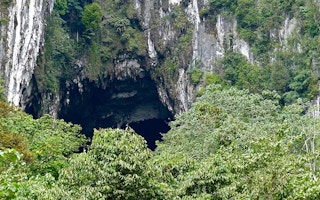The Malaysian state of Sarawak is committing to the preservation of 80 per cent of its land area as primary and secondary forest, according to an announcement by Sarawak Chief Minister Datuk Patinggi Abang Johari Tun Openg made February 26 in the city of Kuching. But some in the conservation community are expressing doubt that these promises will come to fruition.
Occupying the northern coast of Borneo, Sarawak’s rainforests are home to unique, disappearing species like endangered proboscis monkeys (Nasalis larvatus) and critically endangered Bornean orangutans (Pongo pygmaeus). But plantation agriculture, timber harvesting and other development pressures have supplanted many areas of Sarawak forest, with data from the Food and Agriculture Organization of the UN (FAO) finding natural forest covered just under 65 per cent of the state in 2010. Other research indicates the amount of 2010 forest coverage may be closer to 57 per cent – much of that heavily degraded by logging, according a 2013 assessment.
But in a speech presented to attendees of a business networking event called The Sarawak Dialogue, Chief Minister Abang Johari indicated the state will be working to preserve and restore the state’s rainforests.
“Sarawak is a small state but it has its obligation in its role to preserve the environment,” Abang Johari said, as reported by regional media outlets. “We make sure that 80 per cent of our land mass must be covered by primary and secondary forests.”
According to news reports of the event, Abang Johari went on to say that Sarawak’s forests provide important environmental services for the world, like generating oxygen.
“We do not even claim the credit for this,” Abang Johari reportedly said. “The rest of the world is enjoying when we are providing free of charge.”
But some aren’t buying it. Sam Lawson, director of the UK-based environmental and human rights watchdog organization Earthsight, told Mongabay that he is “really suspicious” of Sarawak’s new commitment, and that he has “no reason to believe anything.”
“I welcome any serious commitment by the Sarawak government to protect what forest remains,” Lawson said, “but given that the administration has a long history of broken promises and disinformation in this regard, I would treat any such promises with a great deal of skepticism.”
Lawson says the state needs to increase transparency and crack down on illegal logging if its conservation commitments are to be believed.
“If Sarawak wants its promises to be taken seriously, the first thing it needs to do is release information about all of the areas of forest licensed for conversion to palm oil and timber plantations,” he said. “It also needs to immediately halt the destructive and commonly illegal commercial logging still taking place in some of the last vestiges of intact forest in the state.”
“
If Sarawak wants its promises to be taken seriously, the first thing it needs to do is release information about all of the areas of forest licensed for conversion to palm oil and timber plantations.
Sam Lawson, director, Earthsight
According to data from Earthsight and other organization analyzed by Global Forest Watch, concession boundaries for oil palm and other kinds of tree plantations covered 32.7 per cent of Sarawak’s land area as of 2010/11. Lawson said he doesn’t believe those boundaries have changed significantly since then, suggesting that if Sarawak is to fulfill its commitment to preserve 80 per cent of its land as primary and secondary forest, then it may need to cancel some of these concessions.
Mongabay reached out to the office of Sarawak’s Chief Minister, but received no response by presstime.
Chief Minister Abang Johari is relatively new to the position, having succeeded Adenan Satem following his death in January 2017. Lawson said that if Abang Johari is really the environmental proponent that he’s claiming to be, “then they need to open the books.”
According to reports of Abang Johari’s announcement, he stated Sarawak is doing its best to preserve the environment.
“We want to share our resources with the world,” Abang Johari reportedly said. “We hope that Sarawak can become a bridge to the world so as to lead to a new beginning.”
This story was published with permission from Mongabay.com. Read the full story.










